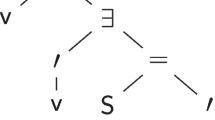Abstract
Even though OpenMath has been around for more than 10 years, there is still confusion about the “semantics of OpenMath”. As the recent MathML3 recommendation semantically bases Content MathML on OpenMath Objects, this question becomes more pressing. One source of confusions about OpenMath semantics is that it is given on two levels: a very weak algebraic semantics for expression trees, which is extended by considering mathematical properties in content dictionaries that interpret the meaning of (constant) symbols. While this two-leveled way to interpret objects is well-understood in logic, it has not been spelt out rigorously for OpenMath. We present two denotational semantics for OpenMath: a construction-oriented semantics that achieves full coverage of all legal OpenMath expressions at the cost of great conceptual complexity, and a symbol-oriented one for a subset of OpenMath expressions. This subset is given by a variant of the OpenMath 2 role system, which—we claim—does not exclude any representations of meaningful mathematical objects.
Similar content being viewed by others
References
Ausbrooks, R., Buswell, S., Carlisle, D., Dalmas, S., Devitt, S., Diaz, A., Froumentin, M., Hunter, R., Ion, P., Kohlhase, M., Miner, R., Poppelier, N., Smith, B., Soiffer, N., Sutor, R., Watt, S.: Mathematical Markup Language (MathML) version 2.0, 2nd edn. W3C Recommendation. World Wide Web Consortium (W3C) (2003)
Ausbrooks, R., Buswell, S., Carlisle, D., Chavchanidze, G., Dalmas, S., Devitt, S., Diaz, A., Dooley, S., Hunter, R., Ion, P., Kohlhase, M., Lazrek, A., Libbrecht, P., Miller, B., Miner, R., Sargent, M., Smith, B., Soiffer, N., Sutor, R., Watt, S.: Mathematical Markup Language (MathML) version 3.0. W3C Recommendation. World Wide Web Consortium (W3C) (2010)
Abbott, J., van Leeuwen, A., Strotmann, A.: Openmath: communicating mathematical information between co-operating agents in a knowledge network. J. Intell. Syst. 8 (1998)
Benzmüller C., Brown C., Kohlhase M.: Higher order semantics and extensionality. J. Symb. Logic 69, 1027–1088 (2004)
Buswell, S., Caprotti, O., Carlisle, D.P., Dewar, M.C., Gaëtano, M., Kohlhase, M.: The Open Math standard, version 2.0. Technical report, The OpenMath Society (2004)
Barwise, J., Feferman, S. (eds.): Model-Theoretic Logics. Springer, Berlin (1985)
Caprotti, O., Cohen, A.: A type system for OpenMath. Technical report, Esprit Project OpenMath (1998)
arith1. Openmath content dictionary. The OpenMath Society (2004)
logic1. Openmath content dictionary. The OpenMath Society (2004)
quant1. Openmath content dictionary. The OpenMath Society (2004)
relation1. Openmath content dictionary. The OpenMath Society (2004)
sdata1. Openmath content dictionary. The OpenMath Society (2004)
Codescu, M., Horozal, F., Kohlhase, M., Mossakowski, T., Rabe, F.: Project abstract: logic atlas and integrator (latin). In: Davenport, J., Farmer, W., Rabe, F., Urban, J. (eds.): Intelligent Computer Mathematics. LNAI, vol. 6824, pp. 289–291. Springer, Berlin (2011)
Church A.: A formulation of the simple theory of types. J. Symb. Logic 5(1), 56–68 (1940)
Davenport, J.H.: A small OpenMath type system. Technical report, The OpenMath Esprit Project (1999)
Davenport, J., Farmer, W., Rabe, F., Urban, J. (eds.): Intelligent Computer Mathematics. In: LNAI, vol. 6824. Springer, Berlin (2011)
Fraenkel, A.A.: Der Begriff “definit” und die Unabhängigkeit des Auswahlsaxioms. Sitzungsberichte der Preussischen Akademie der Wissenschaften, Physikalisch-mathematische Klasse, 1922. Reprinted: Fraenkel, A.A.: The notion of “definite” and the independence of the axiom of choice. Source books in the history of the sciences series, pp. 284–289. Harvard University Press, Cambridge, 3rd printing, 1997 edition (1967)
Fraenkel, A.A.: The notion of “definite” and the independence of the axiom of choice. Source books in the history of the sciences series, pp. 284–289. Harvard University Press, Cambridge, 3rd printing, 1997 edition (1967)
Kohlhase, M., Mossakowski, T., Rabe, F.: Latin: logic atlas and integrator. http://latin.omdoc.org
Kohlhase, M.: OMDoc—an open markup format for mathematical documents, version 1.2. In: LNAI, vol. 4180. Springer, Berlin, August 2006
Kohlhase, M., Rabe, F., Coen, C.S.: A foundational view on integration problems. In: Davenport, J., Farmer, W., Rabe, F., Urban, J. (eds.) Intelligent Computer Mathematics. LNAI, vol. 6824, pp. 107–122. Springer, Berlin (2011)
Lambek J., Scott P.: Introduction to Higher-Order Categorical Logic. Cambridge Studies in Advanced Mathematics, vol. 7. Cambridge University Press, Cambridge (1986)
OpenMath content dictionaries. http://www.openmath.org/cd/. Accessed June 2008
Rabe, F.: Representing logics and logic translations. PhD thesis, Jacobs University Bremen (2008)
Rabe, F., Kohlhase, M.: An exchange format for modular knowledge. In: Sutcliffe, G., Rudnicki, P., Schmidt, R., Konev, B., Schulz, S. (eds.) Proceedings of the LPAR Workshops: Knowledge Exchange: Automated Provers and Proof Assistants, and The 7th International Workshop on the Implementation of Logics, no. 418 in CEUR Workshop Proceedings, pp. 50–68, Aachen, 2008
Rabe, F., Kohlhase, M.: A better role system for OpenMath. In: Davenport, J.H. (ed.) 22nd OpenMath Workshop, July 2009
Rabe, F., Kohlhase, M.: A scalable module system. Inf. Comput. (2011, submitted)
Robinson, A.: On the application of symbolic logic to algebra. In: Proceedings of the International Congress of Mathematicians, pp. 686–694. American Mathematical Society (1950)
Strotmann, A.: The categorial type of openmath objects. In: Asperti, A., Bancerek, G., Trybulec, A. (eds.) Mathematical Knowledge Management, MKM’04. LNAI, vol. 3119, pp. 378–392. Springer, Berlin (2004)
Tarski A., Vaught R.: Arithmetical extensions of relational systems. Compos. Math. 13, 81–102 (1956)
Whitehead A., Russell B.: Principia Mathematica. Cambridge University Press, Cambridge (1913)
Zermelo, E.: Untersuchungen ber die Grundlagen der Mengenlehre I. Math. Ann. 65, 261–281 (1908). English title: Investigations in the foundations of set theory I
Author information
Authors and Affiliations
Corresponding author
Rights and permissions
About this article
Cite this article
Kohlhase, M., Rabe, F. Semantics of OpenMath and MathML3. Math.Comput.Sci. 6, 235–260 (2012). https://doi.org/10.1007/s11786-012-0113-x
Received:
Revised:
Accepted:
Published:
Issue Date:
DOI: https://doi.org/10.1007/s11786-012-0113-x



